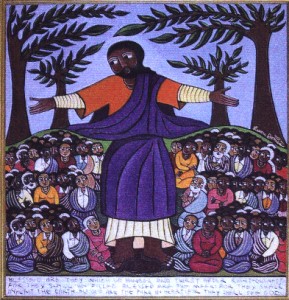Note: If you wish to receive, via e-mail, (1) my weekly newsletter or (2) daily copies of these posts, notify me at rrbates1951 at gmail dot com and I will send it/them to you. I promise not to share your e-mail address with anyone. To unsubscribe, send me a follow-up email.
Spiritual Sunday
Today’s readings from the Bible are particularly rich, with instructions from Micah and Jesus functioning themselves as poems. I therefore share them both, along with a Malcolm Guite sonnet inspired by the Beatitudes.
While it’s hard to rank favorite passages in the Bible, the reading from Micah (6:6-8) is in my top five. The prophet, writing in the 8th century BCE, concludes with words that are powerful in their simplicity. After raising expectations sky-high about what God wants (burnt offerings, year-old calves, thousands of rams, rivers of oil, our firstborn), Micah surprises by presenting requirements that are well within the reach of all of us and that therefore strike with the force of revelation. The shift in perspective arrives like a moment of grace.
To enhance the drama, English translations essentially have Micah’s concluding words delivered in three anapests (short-short-long} followed by two slow and deliberate trochees (long-short). What does God require of us? Think of “to do,” “to love,” and “to walk” as elided into single syllables with “to walk” simultaneously concluding an anapest and commencing a trochee. God requires nothing of us “but to do jús-tice/and to love kínd-ness/and to walk húm- [shift into trochee] bly/ wíth your/ Gód:
The flurry of words, like the flurry of activities, slows down to remind us what is most important. The final stress ends, as it must, upon God:
“With what shall I come before the Lord,
and bow myself before God on high?Shall I come before him with burnt-offerings,
with calves a year old?Will the Lord be pleased with thousands of rams,
with tens of thousands of rivers of oil?Shall I give my firstborn for my transgression,
the fruit of my body for the sin of my soul?”He has told you, O mortal, what is good;
and what does the Lord require of youbut to do justice, and to love kindness,
and to walk humbly with your God?
The Sermon on the Mount (Matthew 5:1-12) has its own poetic power, with the word “Blessed” casting its blessed influence over all the rest. That rest, meanwhile, consists of a series of apparent contractions that open up revolutionary new possibilities:
When Jesus saw the crowds, he went up the mountain; and after he sat down, his disciples came to him. Then he began to speak, and taught them, saying:
“Blessed are the poor in spirit, for theirs is the kingdom of heaven.
“Blessed are those who mourn, for they will be comforted.
“Blessed are the meek, for they will inherit the earth.
“Blessed are those who hunger and thirst for righteousness, for they will be filled.
“Blessed are the merciful, for they will receive mercy.
“Blessed are the pure in heart, for they will see God.
“Blessed are the peacemakers, for they will be called children of God.
“Blessed are those who are persecuted for righteousness’ sake, for theirs is the kingdom of heaven.
“Blessed are you when people revile you and persecute you and utter all kinds of evil against you falsely on my account. Rejoice and be glad, for your reward is great in heaven, for in the same way they persecuted the prophets who were before you.”
Guite, the Anglican rector who seems to have a sonnet for every Sunday reading, certainly has one for Sermon on the Mount. In his image, Jesus helps us momentarily to see that, beyond the veil—beyond hopeless longing, grief, and persecution—“the kingdom coming and the Son returning.” Like many poets, most famously John Donne, Guite puns on the word “Son.” We may feel trapped in “this pre-dawn dark,” and yet Jesus’s words, like “a lovely lantern on a hill,” lighten darkness and dispel doubt.
Beatitudes
By Malcolm GuiteWe bless you, who have spelt your blessings out,
And set this lovely lantern on a hill
Lightening darkness and dispelling doubt
By lifting for a little while the veil.
For longing is the veil of satisfaction
And grief the veil of future happiness
We glimpse beneath the veil of persecution
The coming kingdom’s overflowing bliss
Oh make us pure of heart and help us see
Amongst the shadows and amidst the mourning
The promised Comforter, alive and free,
The kingdom coming and the Son returning,
That even in this pre-dawn dark we might
At once reveal and revel in your light.
The darkest hour is just before the Son rises.


